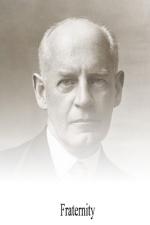Mr. Stone paused, and looked into his cup. There were some grounds in it. He drank them, and went on:
“’The fratricidal principle of the survival of the fittest, which in those days was England’s moral teaching, had made the country one huge butcher’s shop. Amongst the carcasses of countless victims there had fattened and grown purple many butchers, physically strengthened by the smell of blood and sawdust. These had begotten many children. Following out the laws of Nature providing against surfeit, a proportion of these children were born with a feeling of distaste for blood and sawdust; many of them, compelled for the purpose of making money to follow in their fathers’ practices, did so unwillingly; some, thanks to their fathers’ butchery, were in a position to abstain from practising; but whether in practice or at leisure, distaste for the scent of blood and sawdust was the common feature that distinguished them. Qualities hitherto but little known, and generally despised—not, as we shall see, without some reason—were developed in them. Self-consciousness, aestheticism, a dislike for waste, a hatred of injustice; these—or some one of these, when coupled with that desire natural to men throughout all ages to accomplish something—constituted the motive forces which enabled them to work their bellows. In practical affairs those who were under the necessity of labouring were driven, under the then machinery of social life, to the humaner and less exacting kinds of butchery, such as the Arts, Education, the practice of Religions and Medicine, and the paid representation of their fellow-creatures. Those not so driven occupied themselves in observing and complaining of the existing state of thing. Each year saw more of their silver cockleshells putting out from port, and the cheeks of those who blew the sails more violently distended. Looking back on that pretty voyage, we see the reason why those ships were doomed never to move, but, seated on the sea-green bosom of that sea, to heave up and down, heading across each other’s bows in the self-same place for ever. That reason, in few words, was this: ’The man who blew should have been in the sea, not on the ship.’”




